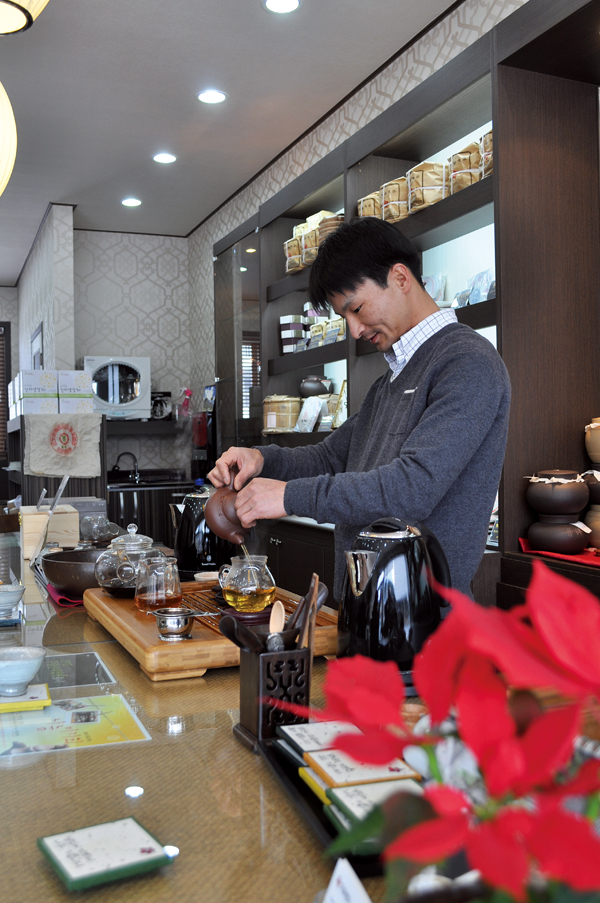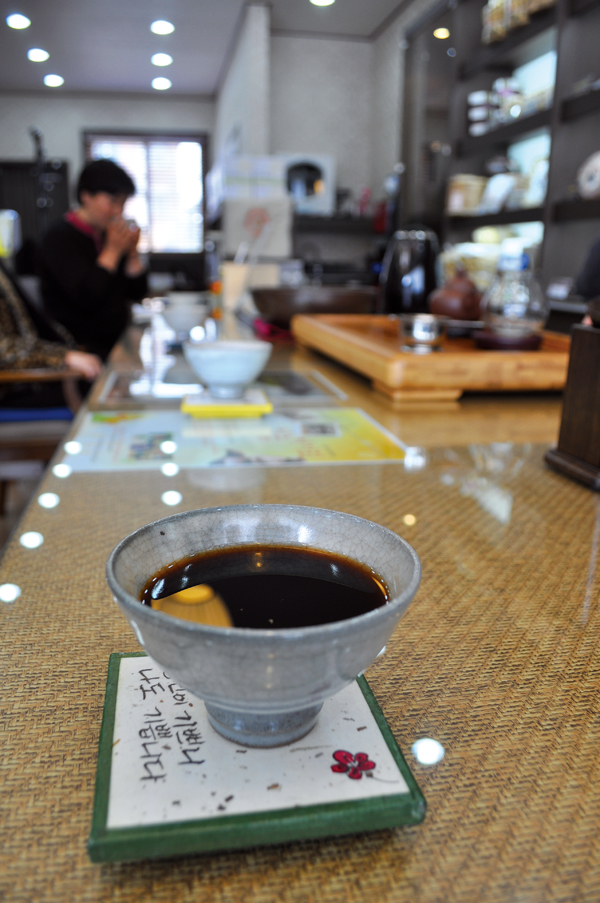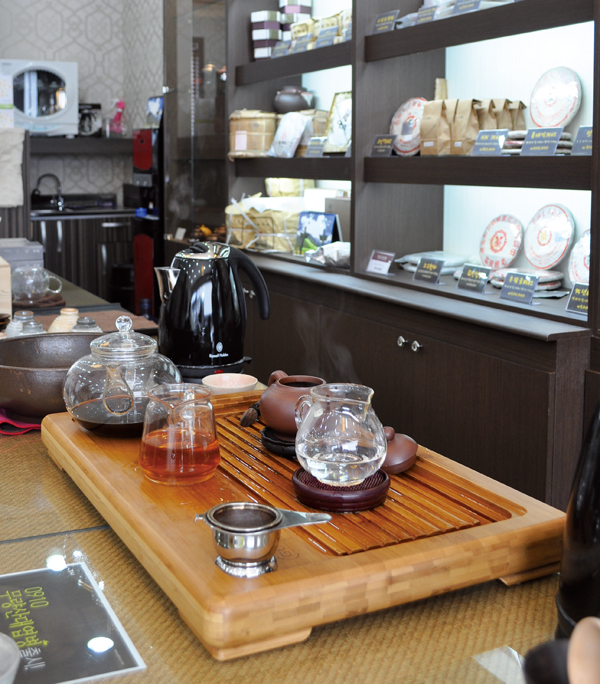
- Updated 2024.4.24 17:16
- All Articles
-
member
icon
-
facebook
cursor
-
twitter
cursor
|
LifestyleFood and Drink |
Classic Chinese tea on menu at Jeju tea shopJiyoo Myeongcha serves up 30 pu-er tea varieties, a novel experience included |
|
|
| |
 |
|
| ▲ Jeon Soo Chul, the owner of Jiyoo Myeongcha offers unlimited pu-er tea to visitors, many of whom are serious tea drinkers. Photos by Yun Seong Un |
Tea might be an easily overlooked choice of beverage but in fact it reflects important political and cultural aspects of society. It’s been less than a century since people, regardless of their social positions, began to enjoy the availability of a large number of teas in Korea. Moreover, coffee has recently yielded some of its dominant share of peoples’ pastime to tea. There are more alternatives now, though coffee still takes up much of a café’s drink menu.
The days when tea was exclusively for the privileged classes of society are gone. Yet people take rather less advantage of all the different options that are now available. While the consumption of alcohol is an integral part of social activities in Korea, it seems that Chinese tea remains generally unknown. This is despite the fact that people are attracted to “well-being” foods, which in turn have sparked businesses like Korean traditional tea houses all over the country to cater to this market.
On Jeju Island, it is Jiyoo Myeongcha, a tea shop in Jeju City that serves the Chinese pu-er tea, which stands out from the rest.
If you visit this tea house expecting it to be like others in Korea — where parties occupy private or semi-private tables — Jiyoo Myeongcha might be a bewildering experience. You will see people sitting next to each other with just one man — with the title of pochasa, the tea equivalent of a barista — making and pouring tea behind a long bar-like table.
Another difference is that you don’t order the tea yourself. It is the owner and pochasa of Jiyoo Myeongcha, Jeon Soo Chul, who chooses from more than 30 pu-er teas to serve you depending on your physical and mental condition. This he ascertains when you walk through the door whether for the first time or as a regular customer.
You may also be surprised that he encourages people to continue drinking. You would be surprised again when you find people drinking there, sometimes for hours at a stretch and wonder what kind of tea can be drunk in such an endless fashion. Then again you may become aware that you are not different from them at all, that you can also drink with no limit.
The varieties of pu-er tea are served exclusively at Jiyoo Myeongcha. You can drink as much as you want for only 10,000 to 20,000 won, even for an all day session if you have the time. Many who come to Jiyoo Myeongcha come alone, concerned only with drinking a good pu-er tea. However, people of various backgrounds often build good friendships by drinking at the tea house, and a preference for pu-er tea has become a good starting place for friendship.
Indeed drinking tea together is a kind of mind-opening experience in and of itself.
| |
 |
|
| ▲ Photos by Yun Seong Un |
However, Jeon explains that many people have become biased against pu-er tea because finding genuine pu-er tea is never easy. More than 90 percent of tea leaves distributed in the market are believed to be fake. Drinking tea has been proven to be beneficial for the body in many ways, and the fact that counterfeits fill the market is never welcome. The emotion surrounding the issue shows that genuine fine-leaf pu-er tea is desperately wanted in spite of its high price.
There are a few conditions that genuine pu-er must satisfy. First, the tea leaves should be produced in China’s Yunnan province, where the altitude is high enough that they are exposed to sufficient sunlight and the tea leaves grow big.
Second, the leaves undergo fermentation and are aged gradually. The environment during storage greatly affects the quality, and as with wine, only the highest quality and best-stored leaves will improve over time, adding to them more value as they ripen. Apart from investment value, it has shown that good pu-er tea has a healing power in the way it warms and cleans out the body. According to Jeon, drinking good pu-er has the same effect as exercising the internal organs. He says it is like comparing it to an internal version of running.
Jeon has influenced many Jeju islanders to become hardcore pu-er tea drinkers, making them go through the process of detoxing their body and mind in a natural way. He proudly guarantees that Jiyoo Myeongcha’s stocks constitute a small fraction of the genuine tea in the market today. He added that although pu-er tea is grown and processed exclusively in China, the leaves improve in flavor and increase in value in the clean environment and unique climate of Jeju as they slowly evolve from secondary oxidation and fermentation.
Jiyoo Myeongcha is creating a new opportunity for more islanders to experience tea and culture. It is located at 456 Yeon-dong, Jeju City. See the accompanying map or call 064-712-5634 (Jeon Soo Chul only speaks Korean). Hours are 11 a.m. to 9 p.m. except Sundays and holidays.
| |
 |
|
| ▲ Photos by Yun Seong Un |
A to Z about pu-er tea
Pu’er tea, which is produced in Yunnan province, China, is no ordinary black tea. In fact, it has marked differences from both secondary oxidation and microbial fermentation processes. Aging improves the flavor, but this is dependent in part on the quality, shape, and size of the tea leaf as well as the conditions under which it is stored: air flow, humidity, sunlight and temperature.
The traditional way of making pu-er takes time. To reduce the maturing period, a new way was invented adjusting some environmental factors, and it differentiates ripened pu’er from raw pu’er. The taste of some raw pu’er drastically improves after a certain degree of fermentation, and its market value also rises drastically.
These teas are sometimes treated as commodities which with careful curing can appreciate in value — sometimes into the tens of thousands of dollars per kilogram. They are prized for their medicinal properties and as hangover cures.
|
|
|
|
|
|
|
|
ⓒ Jeju Weekly 2009 (http://www.jejuweekly.net)
All materials on this site are protected under the Korean Copyright Law and may not be reproduced, distributed, transmitted, displayed, published without the prior consent of Jeju Weekly. |
|
|
|
|
| Jeju-Asia's No.1 for Cruise |
|
|
|
Title:The jeju Weekly(제주위클리) | Mail to editor@jejuweekly.net | Phone: +82-64-724-7776 Fax: +82-64-724-7796
#503, 36-1, Seogwang-ro, Jeju-si, Jeju-do, Korea, 63148
Registration Number: Jeju, Ah01158(제주,아01158) | Date of Registration: November 10,2022 | Publisher&Editor : Hee Tak Ko | Youth policy: Hee Tak Ko
Copyright ⓒ 2009 All materials on this site are protected under the Korean Copyright Law and may not be reproduced, distributed, transmitted, displayed, published
without the prior consent of jeju weekly.com.

|






















